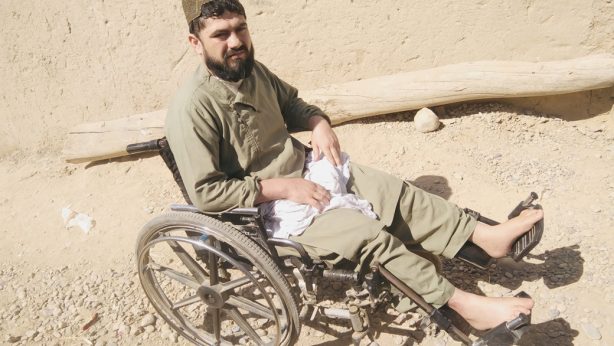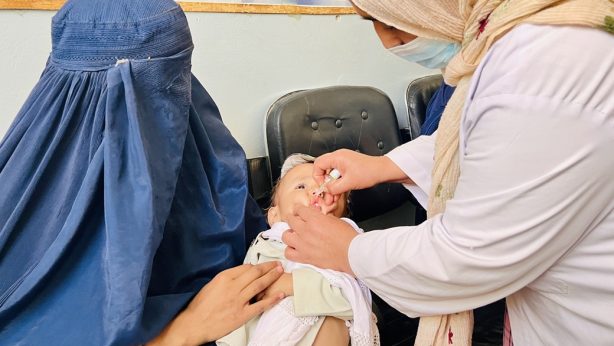The Hidden Pain of Polio: A Story of Suffering, Endurance, and Hope

Raqiba Hamidi
Badakhshan, Afghanistan – Khadija, a 40-year-old resident of Wurduj district in Badakhshan, has a poignant story to tell. She is the mother of three children: 12-year-old Rahman, 10-year-old Adel, and 8-year-old Zainab.
Her youngest daughter, Zainab, contracted polio at the age of one, and since then, her disability has affected the lives of all family members.
“When Zainab was little, her legs became weak, and she couldn’t walk properly. This situation was very concerning, so we immediately took her to a health center for treatment,” Khadija says.
Doctors at the Red Crescent hospital diagnosed Zainab with polio. They told Khadija and her husband that this disease has no cure and could lead to severe and permanent disability.
The doctors were right; Zainab’s legs became paralyzed, and she now relies on others for mobility.
Khadija, speaking about the disease that has profoundly affected her and her family’s lives, says, “It is very hard to see my daughter unable to walk like other children and constantly needing someone else’s help.”
Zainab’s family also faces severe economic challenges. Khadija’s husband, Safar Mohammad, is unemployed and has no income.
“Zainab’s treatment costs and the need for special care have placed significant pressure on our family. For a family living in a remote area, these issues are particularly difficult,” Khadija explains.
 Khadija’s youngest daughter Zainab, contracted polio at the age of one, and since then, her disability has affected the lives of all family members. © Polio Free Afghanistan /2024/ Raqiba Hamidi
Khadija’s youngest daughter Zainab, contracted polio at the age of one, and since then, her disability has affected the lives of all family members. © Polio Free Afghanistan /2024/ Raqiba Hamidi
Despite the challenges, Khadija and other family members continue to support Zainab. She says, “We are all very kind and sympathetic towards Zainab. Both her brothers love her very much and try their best to keep her happy.”
Zainab’s older brother, Rahman, speaks about his sister’s condition: “It is very painful for me to see my sister in such a bad situation. I worry about her every day, but I try to stay strong and support her.”
“My hope is that my sister’s condition improves and she can return to a normal life. I hope she can go to school and play with her friends,” he adds.
Rahman also emphasizes the importance of vaccination, saying, “My message to all families is to take vaccination seriously and not neglect the prevention of polio. Vaccines can protect children from dangerous diseases like polio.”
Dr. Ramiz Sedi, a doctor from Badakhshan, also emphasizes the importance of vaccination, saying, “Polio is a viral disease that can lead to permanent paralysis or even death, but the polio vaccine can prevent this devastating disease.”
“Families should take serious steps against the polio virus and vaccinate their children on time to prevent this disease,” he adds.
 Zainab’s older brother, Rahman, speaks about his sister’s condition: “It is very painful for me to see my sister in such a bad situation. I worry about her every day, but I try to stay strong and support her.” © Polio Free Afghanistan /2024/ Raqiba Hamidi
Zainab’s older brother, Rahman, speaks about his sister’s condition: “It is very painful for me to see my sister in such a bad situation. I worry about her every day, but I try to stay strong and support her.” © Polio Free Afghanistan /2024/ Raqiba Hamidi
Dr. Sedi further explains, “When a child contracts this disease, they become a heavy burden on the family and society because the child becomes disabled and cannot live like a healthy person.”
Zainab’s story highlights the importance of raising awareness about vaccination. When families understand the importance of vaccines and have access to them, many problems can be resolved.
Improving healthcare infrastructure, increasing access to vaccines, and providing social support are steps that can help reduce polio cases and improve the lives of people like Zainab.
In conclusion, this story serves as a crucial reminder that every child deserves a healthy and happy life. Vaccination not only protects children but also creates a brighter future for communities.
Considering this reality, everyone should contribute to the fight against preventable diseases like polio and ensure that every child has the opportunity to thrive in a better future.


